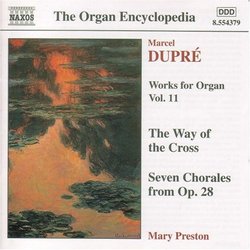| All Artists: Marcel Dupre, Mary Preston Title: Dupr�: Works for Organ Vol. 11 Members Wishing: 0 Total Copies: 0 Label: Naxos Release Date: 8/15/2000 Genre: Classical Styles: Chamber Music, Historical Periods, Classical (c.1770-1830) Number of Discs: 1 SwapaCD Credits: 1 UPCs: 636943437926, 063694343792 |
Search - Marcel Dupre, Mary Preston :: Dupr�: Works for Organ Vol. 11
 | Marcel Dupre, Mary Preston Dupr�: Works for Organ Vol. 11 Genre: Classical
|
Larger Image |
CD Details |
CD ReviewsFine version of this important work G.D. | Norway | 07/31/2009 (4 out of 5 stars) "Le Chemin de la Croix is possibly Dupré's masterpiece, displaying his contrapuntal mastery and his ability to write for the organ in a huge expressive range to the uttermost, but it is also less immediately approachable than many of his other works. The individual stations - or meditations on the stations - are relatively autonomous, but form a grand structure and does as such remind one briefly of Messiaen (and so, at times, does the musical language), through the use of leitmotifs and recurring (and developing) rhythmic figures. The various sections are rather pictorial, and this is where Dupré's organ writing skills come to their fore. Listen, for example, to his depiction of the three times Jesus falls on the way to Calvary, how Dupré manages to depict the very human exhaustiveness and the weight of the cross, but also something far more transcendental, making it sound far more profoundly urgent and harrowing each time. But the work as a whole is mostly impressive in virtue of the range of subtly changing moods - much of it various nuances of darkness, but there is also bleak tenderness, such as the meeting between Jesus and Mary. But for the most part, this generally dark work, has an expressive range from solemnity to horror, and with a marvelous range of subtly characterized nuances in between - listen, for instance, to the pictorial realization of disgrace and shame in `Jesus is stripped of his clothes'. The work ends with the promise of Resurrection, but the music here is more otherworldly than joyous or optimistic. The instrument (the 4-84 Fish organ of the Meyerson Symphony Center) is an impressive one, and Preston has a deep understanding of the work and is able to realize the wide range of textures and subtly differentiate the various moods. Tempi are relatively slow, but not objectionably so - although she is a little too cautious in certain of the more climactic sections, thus dulling the impact. Maybe the devotional rather than fervently dramatic character of the performance will appeal to people more sympathetic to the obviously deeply felt religiousness of the work (rather than looking for and appreciating the abstract allegoricity of the story)? The coupling is seven short chorales from op. 28, expressing seven subtly varied moods and played with equal finesse and panache, and the sound is well-balanced, if (I think, at least) perhaps a tad constricted ." Superb Performance in Demonstration Sound T. Swensen | S.F. Bay Area | 12/06/2008 (5 out of 5 stars) "The major work on this recording is a substantial composition,
and justly representative of late French organ writing. The performance is altogether first-rate, and the work grips my attention from the first bars. The 14 Stations of the Cross were bound to attract the interest of great organist-composers, and Dupre's composition is an excellent example of a thematic program lending interpretive guidance to a piece of music. Sonically, it's hard to imagine better recording quality than what Mary Preston is given here. The Fisk organ is a magnificent instrument, and while one would assume a church acoustic to be the most natural setting for this music, the Meyerson Symphony Center fits this work incredibly well. The recording reveals deep, resonate bass, yet with ample bite and clarity; a huge range of colors; very wide dynamic range. This is demonstration class sound, and indeed this is one disc I take when I'm evaluating speaker systems. If you are a fan of French organ music, this should be high on your list of discs to acquire. Everything about the interpretation feels right, and I find myself becoming lost in the sound world of the composition. Recommended without reservation." |

 Track Listings (21) - Disc #1
Track Listings (21) - Disc #1